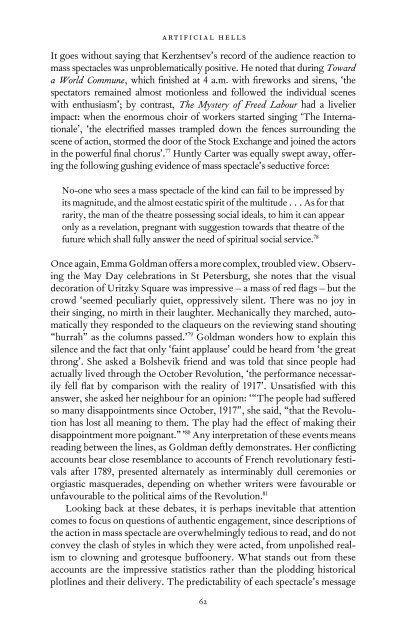Participatory Art and the Politics of Spectatorship - autonomous ...
Participatory Art and the Politics of Spectatorship - autonomous ...
Participatory Art and the Politics of Spectatorship - autonomous ...
You also want an ePaper? Increase the reach of your titles
YUMPU automatically turns print PDFs into web optimized ePapers that Google loves.
artificial hells<br />
It goes without saying that Kerzhentsev’s record <strong>of</strong> <strong>the</strong> audience reaction to<br />
mass spectacles was unproblematically positive. He noted that during Toward<br />
a World Commune, which fi nished at 4 a.m. with fi reworks <strong>and</strong> sirens, ‘<strong>the</strong><br />
spectators remained almost motionless <strong>and</strong> followed <strong>the</strong> individual scenes<br />
with enthusiasm’; by contrast, The Mystery <strong>of</strong> Freed Labour had a livelier<br />
impact: when <strong>the</strong> enormous choir <strong>of</strong> workers started singing ‘The Internationale’,<br />
‘<strong>the</strong> electrifi ed masses trampled down <strong>the</strong> fences surrounding <strong>the</strong><br />
scene <strong>of</strong> action, stormed <strong>the</strong> door <strong>of</strong> <strong>the</strong> Stock Exchange <strong>and</strong> joined <strong>the</strong> actors<br />
in <strong>the</strong> powerful fi nal chorus’. 77 Huntly Carter was equally swept away, <strong>of</strong>fering<br />
<strong>the</strong> following gushing evidence <strong>of</strong> mass spectacle’s seductive force:<br />
No- one who sees a mass spectacle <strong>of</strong> <strong>the</strong> kind can fail to be impressed by<br />
its magnitude, <strong>and</strong> <strong>the</strong> almost ecstatic spirit <strong>of</strong> <strong>the</strong> multitude . . . As for that<br />
rarity, <strong>the</strong> man <strong>of</strong> <strong>the</strong> <strong>the</strong>atre possessing social ideals, to him it can appear<br />
only as a revelation, pregnant with suggestion towards that <strong>the</strong>atre <strong>of</strong> <strong>the</strong><br />
future which shall fully answer <strong>the</strong> need <strong>of</strong> spiritual social service. 78<br />
Once again, Emma Goldman <strong>of</strong>fers a more complex, troubled view. Observing<br />
<strong>the</strong> May Day celebrations in St Petersburg, she notes that <strong>the</strong> visual<br />
decoration <strong>of</strong> Uritzky Square was impressive – a mass <strong>of</strong> red fl ags – but <strong>the</strong><br />
crowd ‘seemed peculiarly quiet, oppressively silent. There was no joy in<br />
<strong>the</strong>ir singing, no mirth in <strong>the</strong>ir laughter. Mechanically <strong>the</strong>y marched, automatically<br />
<strong>the</strong>y responded to <strong>the</strong> claqueurs on <strong>the</strong> reviewing st<strong>and</strong> shouting<br />
“hurrah” as <strong>the</strong> columns passed.’ 79 Goldman wonders how to explain this<br />
silence <strong>and</strong> <strong>the</strong> fact that only ‘faint applause’ could be heard from ‘<strong>the</strong> great<br />
throng’. She asked a Bolshevik friend <strong>and</strong> was told that since people had<br />
actually lived through <strong>the</strong> October Revolution, ‘<strong>the</strong> performance necessarily<br />
fell fl at by comparison with <strong>the</strong> reality <strong>of</strong> 1917’. Unsatisfi ed with this<br />
answer, she asked her neighbour for an opinion: ‘“The people had suffered<br />
so many disappointments since October, 1917”, she said, “that <strong>the</strong> Revolution<br />
has lost all meaning to <strong>the</strong>m. The play had <strong>the</strong> effect <strong>of</strong> making <strong>the</strong>ir<br />
disappointment more poignant.” ’ 80 Any interpretation <strong>of</strong> <strong>the</strong>se events means<br />
reading between <strong>the</strong> lines, as Goldman deftly demonstrates. Her confl icting<br />
accounts bear close resemblance to accounts <strong>of</strong> French revolutionary festivals<br />
after 1789, presented alternately as interminably dull ceremonies or<br />
orgiastic masquerades, depending on whe<strong>the</strong>r writers were favourable or<br />
unfavourable to <strong>the</strong> political aims <strong>of</strong> <strong>the</strong> Revolution. 81<br />
Looking back at <strong>the</strong>se debates, it is perhaps inevitable that attention<br />
comes to focus on questions <strong>of</strong> au<strong>the</strong>ntic engagement, since descriptions <strong>of</strong><br />
<strong>the</strong> action in mass spectacle are overwhelmingly tedious to read, <strong>and</strong> do not<br />
convey <strong>the</strong> clash <strong>of</strong> styles in which <strong>the</strong>y were acted, from unpolished realism<br />
to clowning <strong>and</strong> grotesque buffoonery. What st<strong>and</strong>s out from <strong>the</strong>se<br />
accounts are <strong>the</strong> impressive statistics ra<strong>the</strong>r than <strong>the</strong> plodding historical<br />
plotlines <strong>and</strong> <strong>the</strong>ir delivery. The predictability <strong>of</strong> each spectacle’s message<br />
62
















